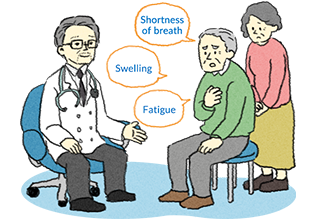What Treatments are Used to Prevent a Relapse of Heart Failure?
With the appropriate treatment, the chance of preventing a relapse is high.
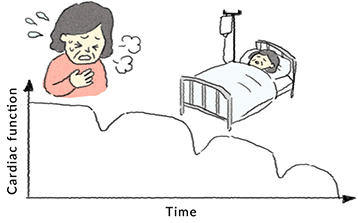
Appropriate treatment can temporarily alleviate symptoms after heart failure occurs. However, unless the heart failure is completely cured, the symptoms will continue to progress, growing steadily worse.
After being hospitalized, rest and treatment based on the guidelines for diagnosis and treatment of acute and chronic heart failure give a patient the best chance to improve their symptoms and prevent a relapse.
Cardiac rehabilitation and members of the heart failure team
It is important to undergo treatment to prevent symptoms suddenly taking a turn for the worse (acute exacerbation), to reduce the number of hospitalizations, and to repair the damage done by worsening symptoms (exacerbation).
In addition to drug therapy, the patient should undergo cardiac rehabilitation. There are an increasing number of medical institutions offering treatment by heart failure teams consisting of members from multiple disciplines, including doctors, nurses, and pharmacists.
Cardiac rehabilitation
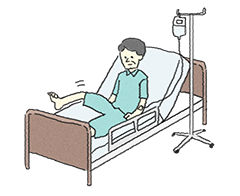
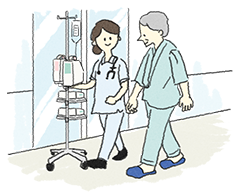
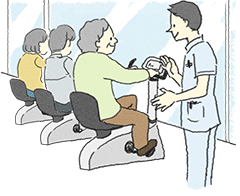
The goals of cardiac rehabilitation are getting the patient back on their feet as soon as possible, improving quality of life by increasing exercise tolerance, and preventing the worsening of symptoms and re-hospitalization. It is divided into three main phases: exercises in or next to bed, in the ward, and in the rehabilitation room.
For the bed phase, the patient exercises with rubber tubes and balls and does heel raises next to the bed.
As the volume of intravenous drugs used for treatment of acute heart failure is decreased, the patient may be able to stand and walk around the ward. In the rehabilitation room, more intensive therapeutic exercises are performed, such as cycling on bicycle ergometers.
Regardless of the type of rehabilitation, it is important to follow the instructions given by the doctors and medical staff.
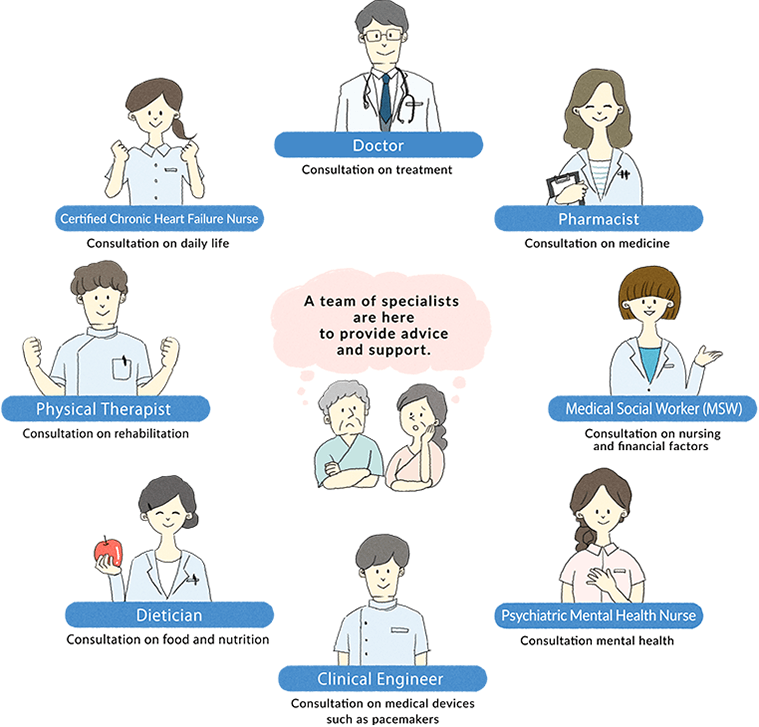
The handoff meeting
- *Video footage: Nippon Medical School Musashi Kosugi Hospital
Drugs recommended in the guidelines for diagnosis and treatment of acute and chronic heart failure
Drugs to relax the heart
| Vasodilators | Open up peripheral blood vessels. (Usually used to treat angina pectoris, myocardial infarctions, etc.) |
|---|
Drugs to strengthen the heart
| Cardiotonics | Strengthen the heart. (Usually used to treat acute circulatory failure.) |
|---|---|
| Digitalis preparations | Increase cardiac contractility and stabilize rapid heart rates. (Usually used to treat atrial fibrillations, tachycardia, etc.) |
Drugs to protect the heart
| ACE inhibitors, ARBs | Widen blood vessels to make it easier for the heart to pump blood. (Usually used to treat hypertension.) |
|---|---|
| Aldosterone antagonists | Prevents damage to the heart muscle and enlargement of the heart. (Usually used to treat hypertension, primary aldosteronism, etc.) |
Drugs to help the heart rest
| Beta blockers | Help the heart to rest when it is overexerting itself. (Usually used to treat angina pectoris, tachycardiac atrial fibrillations etc.) |
|---|
Drugs to reduce swelling
| Diuretics | Flush excess water out of the body and reduce swelling. (Usually used to treat hypertension, urinary tract stones, etc.) |
|---|






